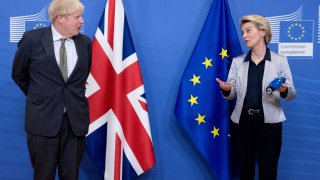
- The U.K. left the EU in January but it agreed to keep the same standards and regulations until the end of the year, so both would have time to develop new trading arrangements.
- However, this transition period ends in three weeks and there are serious concerns they will not have a new agreement ready by then.
BRUSSELS — U.K. Prime Minister Boris Johnson traveled to Brussels on Wednesday evening as an impasse over trade talks with the European Union threatens a no-deal Brexit.
The U.K. left the EU in January but it agreed to keep the same standards and regulations until the end of the year, so both sides would have time to develop new trading arrangements. However, this transition period ends in three weeks and there are serious concerns that they will not have a new agreement ready by then.
Johnson is having a working dinner with European Commission President Ursula von der Leyen, which started 8 p.m. local time, in an attempt to find political solutions to three outstanding issues in the trade talks: fisheries, competition rules and arbitration over their potential new deal. Negotiators have been stuck on these three areas since early in the summer.
A spokesperson for the European Commission, the EU's executive arm, said Tuesday that the meeting "will be to try and lift substantial impasses so then the negotiators can continue their work." This suggests that there could be further negotiations after Wednesday's dinner rather than this meeting becoming a make-it-or-break-it moment.
Before leaving for the Belgian capital, Johnson tweeted that a "good deal is still there to be done."
Compromise?
The talks are particularly difficult because it's the first time in the EU's history that both parties are looking to diverge from a current set of rules. Traditionally, new trade deals result in an harmonization of food, labor and other standards.
Money Report
The EU's aim is to ensure its market is not undermined by the U.K.'s departure from the political bloc. At the same time, the U.K. wants to regain full power over the sort of policies and regulations it decides to follow. Finding common ground between these two positions involves compromise.
Speaking Tuesday, the EU's chief Brexit negotiator Michel Barnier said: "We will never sacrifice our future for the present. Access to our market comes with conditions."
Michael Gove, a U.K. government minister, told the BBC on Wednesday that "there needed to be movement from both sides" and that the U.K. wants control of its own rules.
No-deal scenario
Failure to get an agreement in the coming weeks would push up taxes and costs for exporters on both sides. However, irrespective of whether a deal is achieved, citizens and businesses on both sides will face different rules from Jan. 1. The idea of the trade deal is to make this change much smoother.
Speaking in the German Parliament on Wednesday, Chancellor Angela Merkel said that "there is still the chance of an agreement" being reached. However, she added that "the integrity of the internal market must be preserved."
EU leaders will hold their last scheduled summit of the year in Brussels on Thursday and Friday, with Brexit negotiators expected to conclude the talks during this time.
Sterling has seen a choppy few days of trading as traders monitor the Brexit trade talks. The pound was around 0.3% higher than the U.S. dollar for the session as the meeting between Johnson and von der Leyen began.






